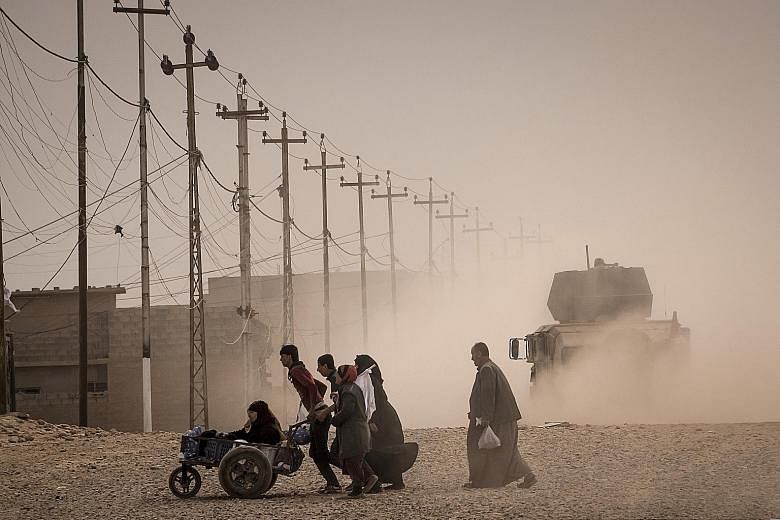QAIYARA (Iraq) • Each day, dozens of families pick their way out, some carrying white flags even as they come under mortar or sniper fire from ISIS.
Billowing black clouds from oil wells set on fire by the militants provide a dystopian background to the scenes of flight; it is so bad south of Mosul that the sheep there have begun turning black.
The military campaign to retake Mosul, Iraq's second-largest city, is in its sixth week and bogged down in a gruelling fight. Seeking to escape the fighting, more civilians than ever are risking evacuation, hoping to find help if they can make it past the militants' gun range.
The numbers tell one story: Almost 70,000 people have been displaced so far, roughly half of them children, said the United Nations.
But the exodus is really only just starting. There could be a million more people still in Mosul, most of them clustered on the west of the Tigris River, where the fighting has not reached.
For those who have been able to reach the aid camps kilometres outside the city, there has been an initial glimpse of hope and relief. Some, like the displaced Iraqis at the Khazer camp outside Mosul, have found that aid workers and soldiers are quick to offer food, handing out cookies or Iraq's traditional diamond-shaped bread.
But it is a particularly hazardous journey for military-age men. Fearing that ISIS fighters will try to escape by posing as civilians, the Iraqi forces are separating men from their families for questioning. In past offensives, the process proved ripe for abuse: The word of an unnamed informant can be enough to send a man to prison, leaving countless families wondering what happened to their husbands and sons.
As the battle against the Islamic State in Iraq and Syria has intensified, more than three million Iraqis - mostly Sunnis - are now thought to be displaced. With most of them still unable to return to their homes even in cities long ago reclaimed from the ISIS militants, such as Fallujah and Ramadi, aid camps have had to serve as home.
Last week, Mr Awad Abdullah, 47, who had left an area south of Mosul and lives in a camp near Irbil, was grief-stricken because he could not find his parents. "I have not heard from them," he said. "I am always crying."
When the battle in Mosul began, everyone hoped that the ISIS militants would abandon the city, as they had in Fallujah. Instead, they dug in for a last stand.
With the fighting becoming ever more brutal and drawn-out, humanitarian workers are concerned that Iraqi forces will adopt more aggressive tactics, putting civilians at greater risk.
When the fight started, Iraqi officers worried that ISIS would destroy the bridges over the Tigris that connect east and west Mosul, cutting off trapped civilians. Now coalition warplanes are knocking the bridges out themselves to prevent ISIS from bringing supplies and car bombs into the battle- scarred east.
Already, there is talk of an Aleppo-style siege of the city centre. And the UN is busily expanding some camps and building more to accommodate perhaps hundreds of thousands more displaced civilians.
Most public estimates envisioned a fight stretching over months, and that appears to be coming true. Many Iraqi officials now predict the Mosul fight could stretch on until the spring, most likely making the battle, and its effect on Iraqi society, part of US President-elect Donald Trump's inheritance.
NYTIMES

